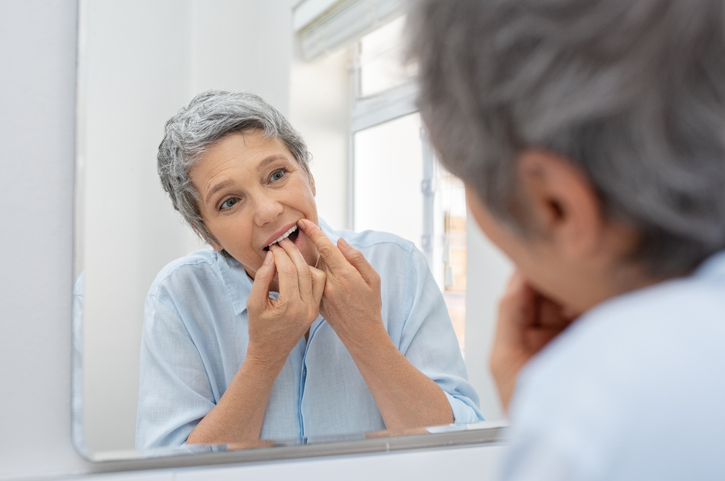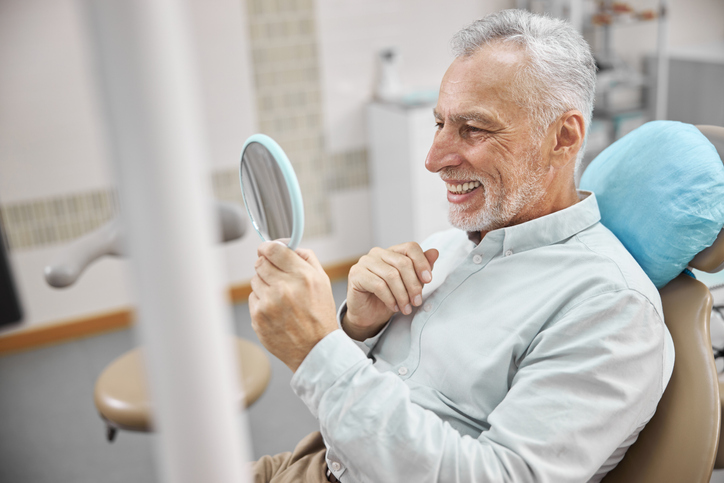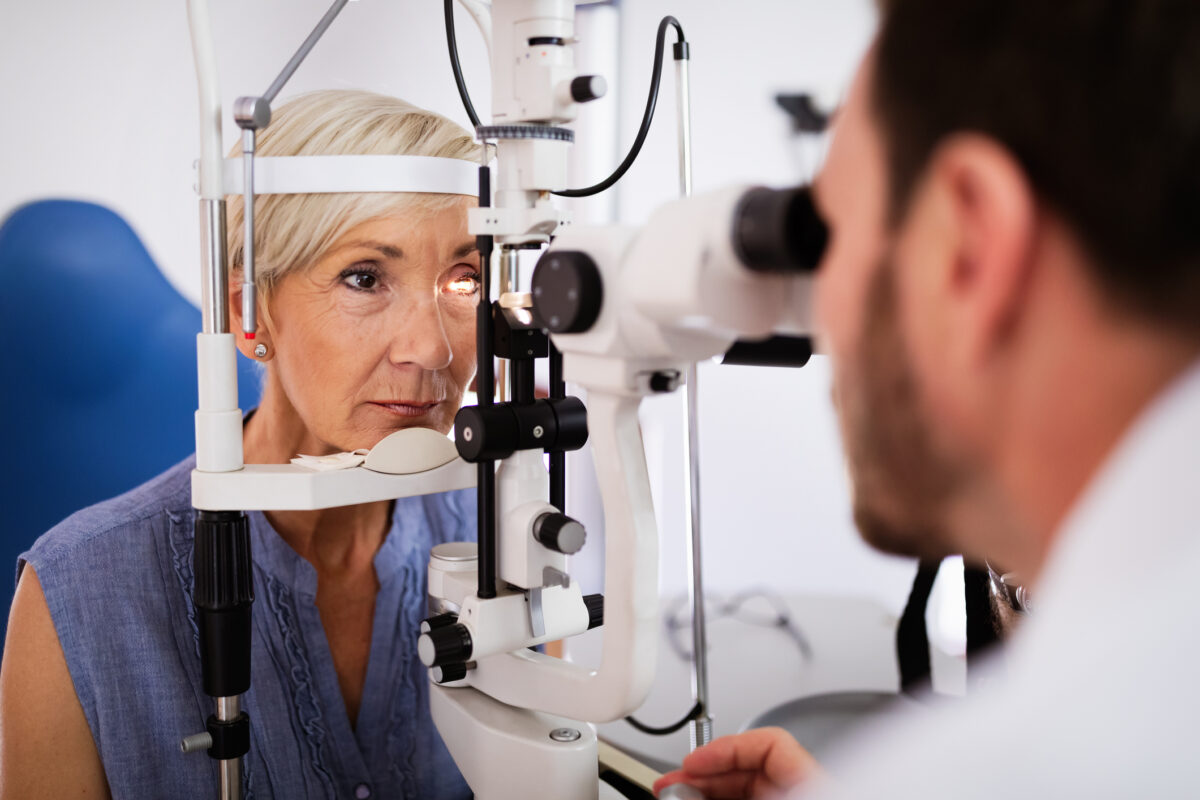“I have just been to the dentist and need not return for another six months! Is it not the most beautiful thought?”
These words came from the mouth of beloved mystery writer Agatha Christie, who clearly did not enjoy her time in the chair.
Maybe that’s you, or maybe you’re among the small percentage of people who enjoy going to the dentist—for reasons like the feeling of fresh, clean teeth or the free bag of dental supplies.
But the main reason Americans avoid seeing the dentist isn’t about fear, it’s about finances, per this ADA and Health Policy Institute report on oral health.
Cost is what keeps 59% of Americans from regular dental visits (regardless of age, income or source of dental benefits), followed by fear at 22%. And as Medicare does not cover routine dental care, the cost concern is valid.
But here’s the good news: There are a number of practical, low-cost things you can do to maintain oral health in your 50s, 60s and beyond.
Teeth Health Q&A With Dental Hygienist Julie Fritz
Julie Fritz, RDH, is a dental hygienist at Royal Oak Dental Group in High Point, North Carolina. Here, she offers interesting insights and practical tips for a healthy smile.
What Changes Happen Naturally in Your Teeth Over Time?
Depending on how your teeth come together, you may have natural wear patterns that occur from grinding and clenching your teeth, Fritz explains. You may also find that as your teeth age, small hairline fractures can occur, and those become susceptible to decay and breakage, she says.
What Dental Health Screenings and Cleanings Are the Most Important?
It’s important to have a teeth cleaning and exam appointment every six months, Fritz says. “Dental x-rays are taken at these appointments to help us see between the teeth so we can look for decay (cavities) and to monitor for build-up and bone loss, which occurs underneath the gums.”
If you have healthy teeth, gums and bone, a cleaning every six months is best, says Fritz. “Your dental practitioner will let you know if you need to increase the frequency of these appointments to maintain the health of your mouth.”
What Changes or Concerns Should You Keep an Eye Out For and When Should You Call a Provider About Them?
“Pain is a pretty good indication that something isn’t right in your mouth,” says Fritz.
You may experience this as hot or cold sensitivity, discomfort when biting, or even a dull ache that occurs out of nowhere. Bleeding is a sign of active bacteria and may indicate changes to the health of your gums and bone. These are all good reasons to see your dentist, Fritz advises.
What Are the Most Important Things You Can Do To Foster Teeth Health as You Age?
Daily brushing is a given. Regular cleanings should also be part of your oral health routine. But perhaps the simplest and most effective way to maintain your teeth as you age? Fritz says it in one word (though in all caps for emphasis!): FLOSS!

“We say it all the time, but the truth is when you don’t floss, you are not cleaning a significant part of each tooth, and that can lead to [other] problems,” she says.
Can You Share Some Tricks of the Trade or Lesser-Known Oral Hygiene Tips?
A Toothpaste Tutorial
To get the most benefit from fluoride toothpaste or from specialty toothpaste for sensitive teeth, you can’t rinse it off, Fritz says. “Brush it on, spit out as much as you can, and let it soak on your teeth for at least 30 minutes to an hour.”
The Right Way to Floss
Flossing isn’t just popping the floss down and back up between the teeth, says Fritz. “You need to curve the floss in a C-shape around each tooth and scrape the side with the floss to remove the plaque.”
Watch What You Eat and Drink
Sipping and snacking all day can cause a lot of damage to your teeth, explains Fritz. “Your teeth need breaks during the day so your saliva can buffer the acids that demineralize your teeth and cause decay.”
To minimize damage, try including drinks with your meals, as well as limiting snacks. You can sip on water, black coffee or unsweetened tea between meals and snacks. “Sugar-free drinks have acidic sweeteners, so they are just as bad for your teeth as sweet drinks like juice and soda,” adds Fritz.
5 Oral Health Concerns Among Older Adults
While the experience of visiting the dentist may not always be pleasant or cost-effective in later life, there are a number of oral health problems specific to the older adult population. So whether you’re a caregiver for an aging parent, partner or relative, or you’re concerned about your own dental health, consider these facts from the CDC if you’re not currently seeing a dentist each year.
- Approximately 96% of adults 65 and up have had a cavity.
- About two in every three adults (68%) over the age of 65 have gum disease. Those with chronic illnesses like heart disease, COPD, diabetes or arthritis have a higher likelihood of developing gum disease.
- Cancers of the mouth, such as oral and pharyngeal cancers, are typically diagnosed in later life.
- Among the 65 and up crowd, nearly one in six have lost all of their teeth, which can have an impact on nutrition.
- Prescription and over-the-counter drugs, which many older adults take, can cause dry mouth. The reduced saliva flow from this condition can increase the risk of cavities.
While you may not be able to prevent all age-related changes to your teeth or even outgrow your dislike of going to the dentist, take steps today to maintain your smile.
What have your experiences been with dental health (good or bad) in later life? What keeps you from going to the dentist?







Is the extra mile news letter free?
Hi Elese – The Extra Mile newsletter is free! You can subscribe using the link on our homepage.
I didn’t know I wasn’t supposed to rinse specialty toothpaste off. Why didn’t my dentist or hygienist tell me? Fortunately, in my late eighties and in spite of my ignorance, I still have a mouth full of healthy teeth thanks to good genes and professional and personal care.
I have never heard a dentist talk about the little brushes that a person can use to get food out from between the teeth. I use two different sizes and floss, not as often as I should but after reading this article I am going to floss the way Julie Fritz suggests. The little brushes help get between my teeth but are they bad?
Great article; Big “Amen” to flossing.
We’re so glad you liked it, Jerry! Flossing is definitely important.
I fixed my bottom dentures 3 years ago. I never wore them they made them too big for my mouth. I keep them in my bathroom so I stay with out teeth on my bottom. My top are half dentures and half my teeth. I wish my bottom dentures would fit me
Money and laziness. Also I’m embarrassed by my lack of hygiene. Dentist know all your secrets by examining your mouth. I’m afraid the dentist knows my less public self.